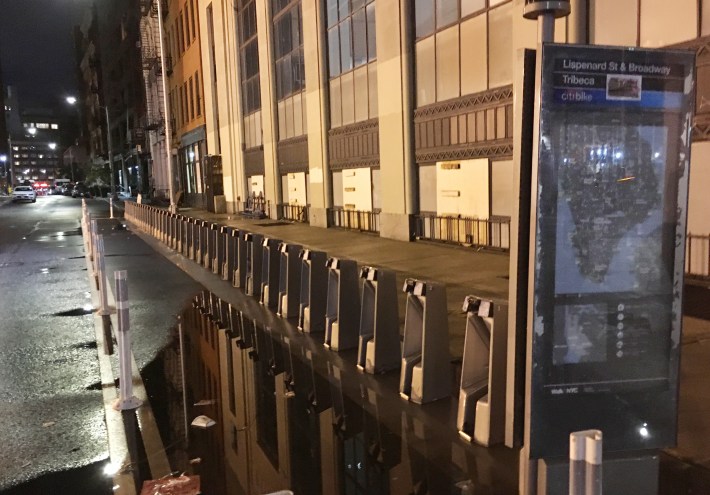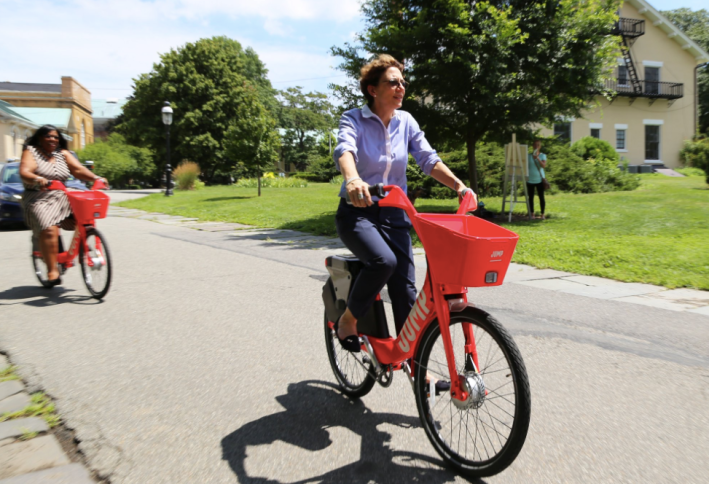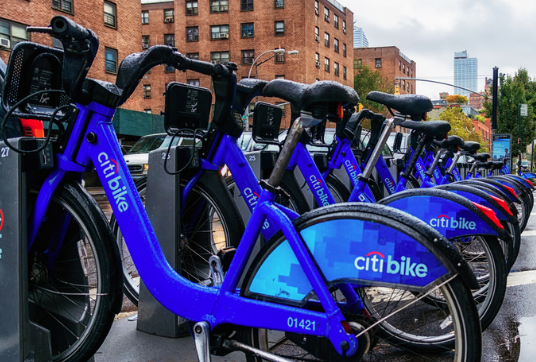Citi Bike will triple its current fleet of 12,000 bikes — and double the system's coverage area — as part of a five-year, $100-million investment from the company's new owner, Lyft, to grow the largest bike share system in North America.
In a statement, Citi Bike said Lyft's money would:
- Raise the Citi Bike fleet size to nearly 40,000 bicycles and more than double the size of the current service area, which is limited to most of Manhattan and tiny slivers of Queens and Brooklyn. Citi Bike's exclusive operating zone currently covers 30 square miles of New York. That would raise to 65 square miles — a zone that would include significant swaths of the boroughs.
- Expand the deployment of pedal-assist e-bikes — though the company would not release a projected number.
- "Immediately" restore the existing system to its required fleet level of 12,000 bikes. The company went through a repair crisis this fall, which, at times, idled almost half its fleet within. The company said the fleet would be restored to full strength by "the end of February."
- Expand the existing "Reduced Fare Bike Share program," which gives NYCHA residents and SNAP recipients memberships for $5 a month.
- Continue to fund associated operating expenses "to improve and expand the system."
"This is a commitment to equity and delivering on our promise of 'Citi Bike for all,'" said Caroline Samponaro, head of Bike, Scooter & Pedestrian Policy for Lyft, which owns Citi Bike's parent company, Motivate. "We have heard countless neighborhoods asking for Citi Bike. So this is about getting something that works into neighborhoods that have been left out. And that will mean more riders and more daily trips."
Citi Bike currently has more than 147,000 annual members. That number would be expected to grow dramatically if Citi Bike expands into commuting-distance neighborhoods such as Sunnyside, Jackson Heights, Washington Heights, Hunts Point, Mott Haven Sunset Park, Crown Heights and elsewhere.
The expansion would be almost entirely docked. Citi Bike has experimented with dockless bikes with a pilot effort in The Bronx, but it has not enjoyed nearly the same level of ridership as the existing docked system.
"Citi Bike has been successful as a dock-based system and we want to build on that success," spokeswoman Julie Wood told Streetsblog. "There may be some refinements as new technology becomes available, but we believe the docked model has proven very successful."
Mayor de Blasio hailed the announcement in a statement Thursday, but it is unclear what, if anything, the city has done to precipitate Lyft's huge expansion. Unlike other forms of mass transit, Citi Bike is not subsidized by the city.
“New York City is one of the world’s great biking cities – and it’s about to get even better,” Hizzoner said in a statement. “This expansion means tens of thousands more New Yorkers are going to have a fast and inexpensive way to get around their city. It also means much more reliable service for all the riders who already use Citi Bike. We welcome Lyft’s investment to make Citi Bike bigger and better. We are ready get to work with communities across the city to make this expansion a success.”

Samponaro said the city's commitment would come in the form of "community outreach" to ensure that Citi Bike docks get properly cited in various neighborhoods. She praised the city as a "partner" in Lyft's effort.
"The city should get tremendous credit," she said. "They are doubling down on their commitment to create a more equitable system by expanding it into more neighborhoods."
For all the good news for Citi Bike fans, there is some bad news for the company's would-be competitors: Citi Bike will retain the exclusive right to operate bike share within its growing service area. The city will retain the right to undertake pilot bike share programs outside of the expanded zone — as it has done in Staten Island, the Rockaways and The Bronx.
Streetsblog asked Department of Transportation Commissioner Polly Trottenberg if the expansion of the Citi Bike exclusive zone suggested that the pilot programs had failed, but she disagreed.
"I think NYC has one of the best docked bike share systems in the world," she said. "And I've heard from all corners, including Streetsblog, that people wanted to see the system expanded. We got a lot of good out of the dockless pilots this summer — lessons learned, things they could do better, things we could do better — and we're looking to expand that system as well. ... It's not an either/or. But this is definitely a doubling-down on our docked system, which we think is world-class."

So Citi Bike is de facto New York's bike share company. Naturally, Citi Bike competitors were annoyed.
A spokesman for Lime — which also operates a pilot program — echoed that sentiment.
“New York’s transportation equity problem requires an immediate solution — and the best solution for New Yorkers is for multiple companies to compete, delivering the most options to every community," said Lime spokesman Evan Thies. "Lime stands ready to deliver for New Yorkers right now.”
Advocates for the poor also blasted the deal.
“Citi Bike has ignored low-income communities of color for years. We need a solution to fix our transportation equity problem now — not in five years,” said NY Communities for Change Executive Director Jonathan Westin. “Giving Citi Bike exclusive rights to an even larger service area will reward the company’s bad behavior with a monopoly, and reduce mobility options and competition at a moment when other companies could provide immediate access to reliable, more affordable options in underserved communities.”
Story was updated at 3 p.m. Thursday to include more information.






